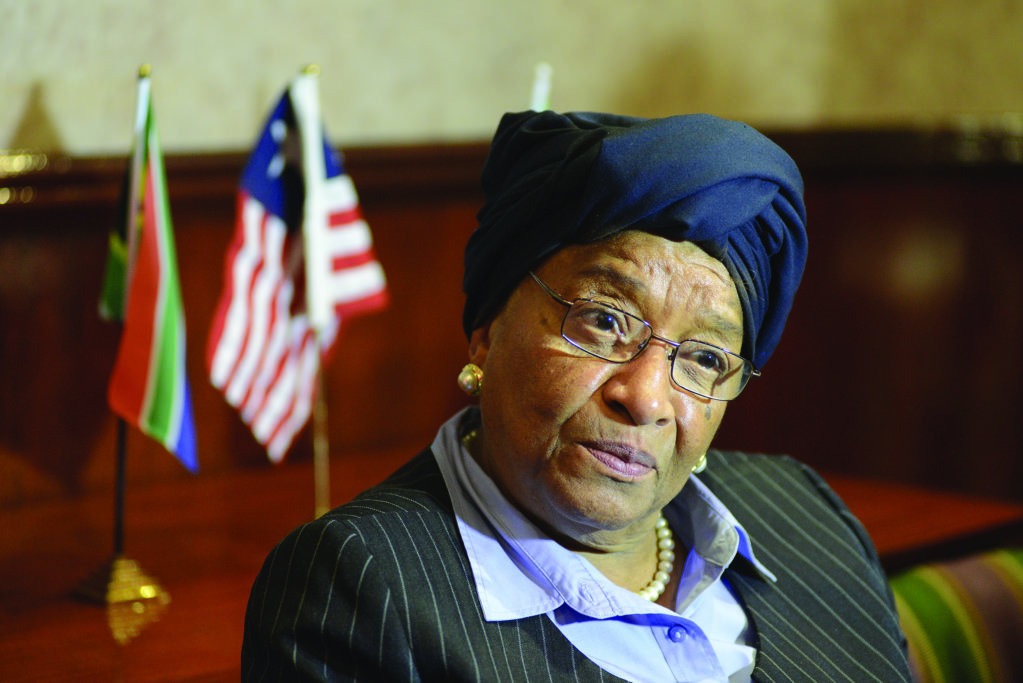We meet Ellen Johnson-Sirleaf on the sidelines of the 25th African Union summit in June in Johannesburg, South Africa. With the theme this year focused on women’s empowerment and the role women can play in advancing Africa’s development, the summit was well-represented by African presidents including Johnson-Sirleaf, the continent’s first female president.
We meet the pint-sized powerhouse at the Johannesburg Chamber of Commerce – where the Liberian delegation was wooing South African investors to Liberia – flanked by her leading men in investment promotion, the Minister of Finance and the Head of the National Investment Commission.
Despite a heavy diary weighed down by a slew of presidential engagements, Johnson-Sirleaf is keen to not let the opportunity to sell the Liberian investment case to potential investors slip by.
“We’re very well-endowed with natural resources. We have an abundance of iron ore, gold, forest resources that represent almost half of all the biodiversity in West Africa, an unbroken coastline that gives a marine economy, and of course agriculture…we are well on our way in rebuilding this economy,” says the 2011 Nobel Peace Prize winner.
It’s a hard sell. Liberia continues to feature amongst the world’s poorest countries. The civil war that engulfed the country for 14 years, following a coup d’ etat in 1980, not only claimed thousands of lives but also stole the country’s economic potential. Economic infrastructure was destroyed, foreign direct investment ground to a halt, capital made a beeline for other markets, and government coffers dried up. Liberia’s economy came to a standstill.

But Johnson-Sirleaf is adamant this is not an economy to be overlooked.
“The Minister of Finance has been working with the World Bank and they tell me that we have moved from negative growth of 0.4% to 1.4%. I’ve told them quite clearly that I don’t agree with those projections. In the next two years we will be growing at least 6 to 7%. There is no reason why we can’t hit double digits in the next 10 years.”
Johnson-Sirleaf claimed the presidential seat in 2005 on a campaign card that promised to rebuild the war-torn country. She held onto her seat in 2011 following her re-election into her second and final term. But in the home run of her presidential race, the Ebola outbreak hit the country and her leadership was tested more than ever before.
“This was a strange disease. We ran away. Our people ran away. Nobody knew what it was. We were all frightened. So we must expect other people were frightened including those from the African Union. But as soon we, Liberians, took it upon ourselves to step up and fight this, others saw our courage and when they joined us, they joined us with force.”
Johnson-Sirleaf insists assistance of the African Union was key in helping Liberia wrestle Ebola to the ground. But Liberia does not enjoy the luxury of resting on its laurels, with news of fresh Ebola cases, and given that it shares borders with Guinea and Ivory Coast, where new infections are still being reported as recently as June.
Johnson-Sirleaf has held onto the Presidential seat for almost a decade. Her run comes to an end this year. Asked whether her political legacy has lived up to the title that always precedes her of being the first female president in Africa, she says: “Only history and you can judge me. I have done my best.”
